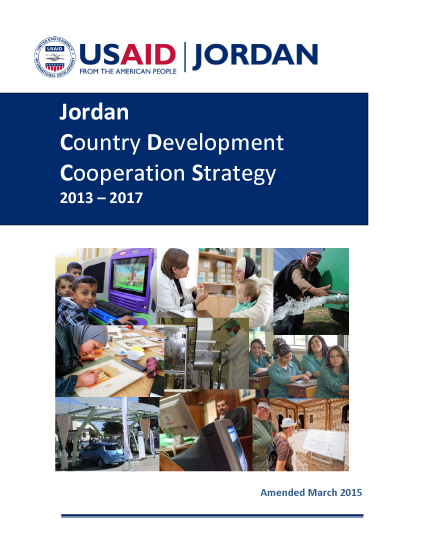Speeches Shim
Jordan and the United States benefit from a long-standing partnership – the value of which is measured in Jordan’s strong leadership role in the region, its strength as a moderate and stable ally in a tumultuous region, and in cooperation on numerous fronts, including the Middle East peace process and counter-terrorism, peacekeeping, and humanitarian efforts.
Jordan faces a number of daunting challenges as it strives to address its development and reform priorities. These social challenges include a rapidly growing population, gaps in the quality of basic education, high unemployment, weak citizen participation in governance and politics, water scarcity, reliance on expensive, imported energy, gender disparities, and an influx of Syrian refugees. At the same time, however, Jordan is well positioned to address these challenges due to several opportunities, including a young workforce, a government that is forward leaning in terms of policy reform, and improving health and education indicators.
This strategy lays out a focused plan to help the GOJ in carrying out its stated commitment to broad-based political and economic reforms to meet the legitimate aspirations of Jordanians. USAID/Jordan’s goal for the 2013 – 2017 strategy period is to improve prosperity, accountability, and equality for a stable, democratic Jordan. This goal will be achieved through the following three development objectives (DOs) and a special development objective (SDO):
- DO 1: Broad-based, inclusive economic development accelerated DO 2: Democratic accountability strengthened DO 3: Essential services to the public improved SDO 4: Gender equality and female empowerment enhanced
A key overall theme of the strategy is complementing support for Jordanian-led structural reform with grassroots activities that will result in more visible, more directly “felt” people-level impact. Grassroots activities will be focused in the country’s poverty pockets, including underserved areas, such as Tafila and Ma’an, and in communities in the north where the influx of Syrian refugees has placed significant strain on public services. As the Mission focuses its support in underserved areas, it will increasingly engage disadvantaged segments of the population, especially youth, women, and the poor. Activities to reinforce policy reform and increased accountability will cut across the program to foster a policy environment that ensures that disadvantaged populations share equitably in economic benefits and social services and are not excluded from democratic processes.
Sustainable growth will be emphasized as another cross-cutting theme through more concerted efforts to strengthen the effectiveness of local partners. This will entail building the capacity of both government institutions and local non-governmental organizations, thereby positioning them to play a more effective role in meeting the country’s development challenges, especially in light of the country’s current and future natural resource and fiscal constraints. Central to this will be the pursuit of more opportunities to engage in direct implementation through government-to-government (G2G) mechanisms and with civil society and service-providing organizations.
The strategic areas of intervention, though diverse, are each an important and mutually reinforcing element of the strategy to ensure broad-based sustainable development. In the absence of one element, there is significant risk that the overarching goal of the strategy will not be achieved. In this context, the strategy will focus increasingly on supporting GOJ efforts to address the demands of citizens for increased employment opportunities in key sectors of the economy positioned to grow. In addition to linking educational outcomes with these high growth areas of the economy, the Mission will add to its education program a needed area of emphasis on early grade reading. Additionally, the strategy will support Jordanian-led reforms to improve electoral administration, promote more accountable government, and reduce opportunity for corruption. Further, in the democracy and governance sector, assistance to civil society organizations (CSOs) will include greater focus on improving service delivery in addition to improving advocacy skills and organizational management. At the same time, the strategy places importance on promoting voluntary family planning as a primary means of helping the GOJ and the Jordanian people ensure that the country’s development outcomes are sustained into the future. Also, by working with the GOJ to more efficiently manage scarce water and energy resources, the country can more responsibly and effectively meet the demands of its growing population. Through a Special DO (SDO), USAID/Jordan will focus on gender equality and female empowerment to foster inclusive development, increase synergies among program areas, and maximize impact. In addition to the above project level assistance, 51 percent of the portfolio will continue to be in the form of a cash transfer to help provide the macroeconomic stability that the GOJ needs to be able to realize the development priorities that it has pledged to undertake.


Comment
Make a general inquiry or suggest an improvement.